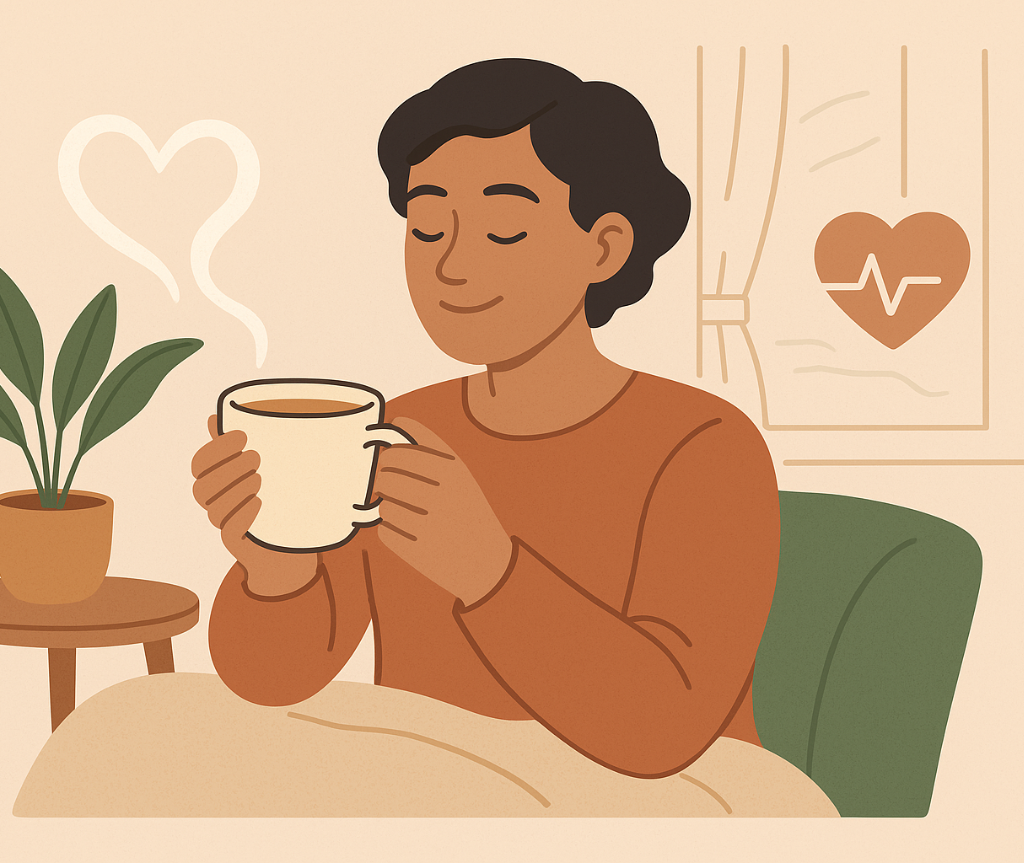There’s something quietly grounding about wrapping your hands around a warm cup of tea. The aroma, the calm, that first slow sip — it’s a ritual many of us turn to without thinking. But here’s the lovely surprise: that soothing habit might also be doing your heart a quiet favour.
More and more research suggests that people who drink tea regularly tend to have lower blood pressure and a reduced risk of heart disease. It’s one of those small, steady choices that add up — the kind that works quietly in the background of everyday life.
How Tea Supports Blood Pressure Health
When blood pressure climbs too high, your heart has to work harder to keep everything flowing — a strain that, over time, can increase your risk of heart attack or stroke. The good news? The natural compounds in tea may help keep things in balance.
Both green and black tea are rich in flavonoids, plant-based antioxidants that support your blood vessels. One standout, epigallocatechin gallate (EGCG), helps them relax by boosting nitric oxide, which widens the arteries so blood can move more freely. Tea also seems to lower levels of endothelin-1, a compound that tightens your blood vessels.
It’s not magic — and it won’t happen overnight. The benefits come from consistency, a few cups each day that gently support your heart over time.
Green Tea: Small Changes, Real Results
If you’ve ever swapped your morning coffee for green tea, you’ve already taken a heart-smart step. Among all tea types, green tea has shown the strongest link to lower blood pressure.
In studies, people who drank green tea daily for about 12 weeks saw their systolic pressure (the top number) drop by around 3 mmHg, and their diastolic pressure (the bottom number) by about 1 mmHg. Those numbers might sound tiny — but even small reductions like that can make a big difference for heart health, says the British Heart Foundation.
Green tea also helps with weight balance and metabolism, two key players in blood pressure control. If you can, aim for 5–6 cups a day, which gives you roughly 200 mg of EGCG — the amount found in many research studies.
Black Tea: Everyday Comfort, Gentle Support
Maybe green tea just isn’t your thing — and that’s perfectly fine. Black tea still carries plenty of heart benefits.
Research shows that drinking three cups of black tea a day can lead to gentle improvements in both the top and bottom blood pressure numbers over time. The effect might be smaller than green tea’s, but it’s meaningful when you think long term.
And black tea feels familiar. It’s easy to find, goes beautifully with a splash of milk or a slice of lemon, and often fits naturally into your day. To get the most from it, let it steep for three to seven minutes, and enjoy it slowly, maybe mid-morning or late afternoon.
It’s a comforting ritual that also happens to be kind to your heart.
Patience Is Part of the Process
Think of tea less like a treatment and more like a daily act of care. You won’t see your blood pressure drop after one cup — or even one week — but as the habit settles in, so do the benefits.
Opt for high-quality teas when you can. They tend to contain more of the powerful plant compounds that do the real work. And if it feels like a big leap, start small: replace one of your usual drinks with tea and see how your body responds.
Tiny rituals, repeated often, have a way of changing things quietly.
What Tea Can — and Can’t — Do
A quick reality check: tea isn’t a cure. If you have high blood pressure, it won’t replace medication or medical advice. But as part of a heart-friendly lifestyle, it can support your efforts in a simple, natural way.
If you’re taking medication, it’s always best to speak with your doctor before making major changes. And skip the sugar when you can — it can undo some of the tea’s natural goodness.
Key Takeaways
Adding tea to your daily rhythm is more than comforting — it’s a small, science-backed way to care for your heart.
- Green tea offers the biggest benefits, especially at 5–6 cups a day.
- Black tea is a gentle, accessible option at three cups daily.
- Benefits usually appear after around 12 weeks of steady sipping.
- Even half a cup a day may reduce your long-term risk of hypertension.
Your cup of tea might just be doing more than warming your hands — it could be helping your heart, sip by sip.



